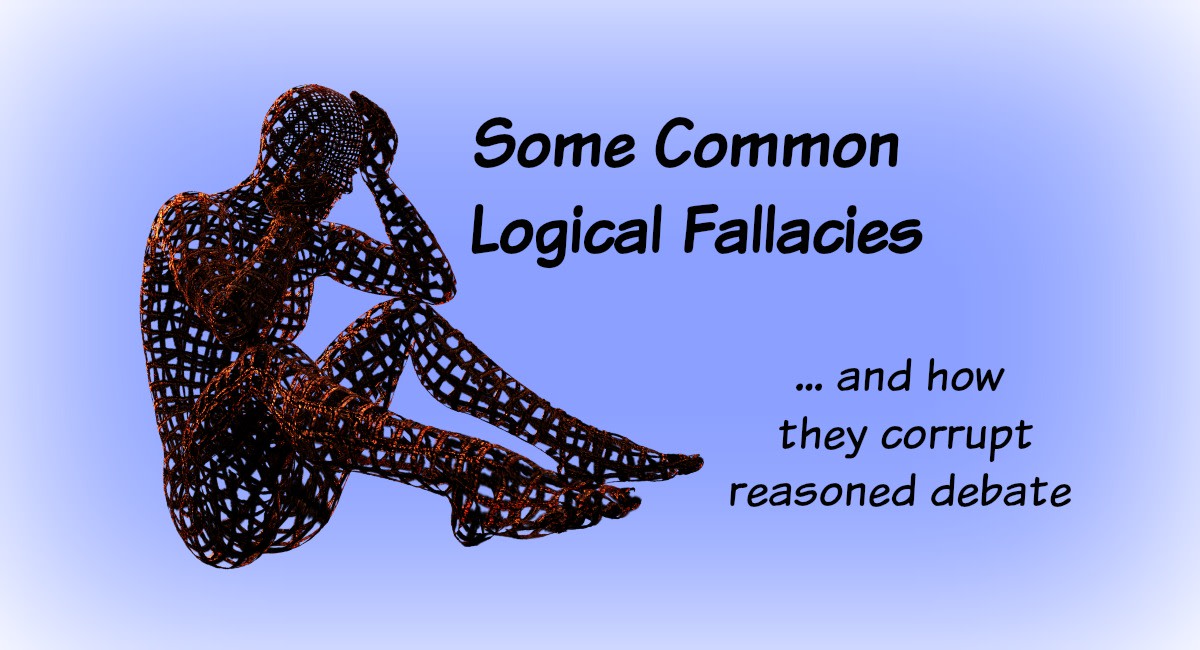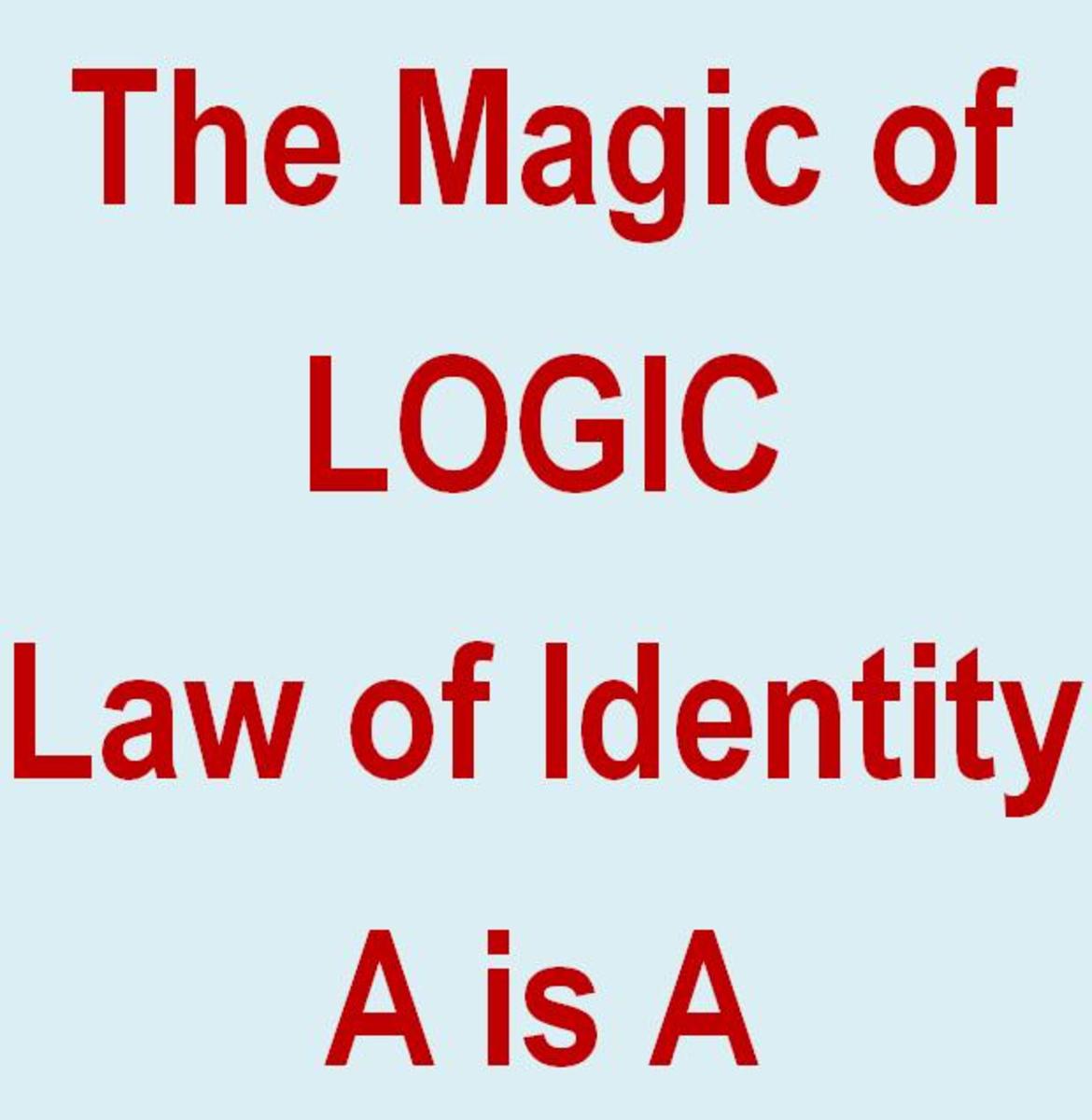Philosophy Simplified: Logical Fallacies
Introduction
Logical fallacies are incorrect arguments in rethorics, often trailing an argument or debate off the path of logic. They appear frequently in everyday conversations, but you can in fact do a lot in order to avoid them. Study this list of fallacies and point out any you make for yourself in a discussion. Sooner or later you'll grow accustomed to using only proper arguments and logic.
There are two major kinds of logical fallacies:
Formal fallacies are all non-sequitur, meaning that there's a lack of connection between the premise(s) and the conclusion(s).
Informal fallacies lack logic in their content while their form is sound and seems alright.

Formal Fallacies
Appeal to probability:
An argument that's based on probability, or in most cases, a debater taking something for granted based on high probability. The most famous example for this fallacy is Murhpy's law:
"What can go wrong will go wrong."
While this is a true statement, no presumptions can be drawn from the exact time of something going wrong and therefore the information is both irrelevant and unreliable.
Anectodal fallacy:
Another frequently used one, the arguer goes on a tale of his own in order to support a certain argument. While fine for an example, most such anecdotes are too isolated to be counter as reliable statistics or experiences.
"I think I'll give up sport and start cooking instead."
"That's not a good idea. When I gave up sport and started cooking I accidentally knocked over a kettle of boiling water and burned myself, suffering a far worse injury than I ever did when playing worse. I heard the neighbor's kitchen once caught fire as well. And my aunt told me ..."
Counter-argument from fallacy:
Don't fall into the trap of refuting conclusions using this article. Even if an argument is logically fallacious, the conclusion may still be correct.
"I'm older than you and have more experience, trust me, it's not a good idea to hike without proper footwear."
"Ha! You resorted to an ad-hominem. Your statement is false."
Existential fallacy:
An existential fallacy is when an arguer presumes a group has items, and such draws a particular conclusion from a universal premise.
"All students in class F are boys. Therefore, there is a boy from class F out there."
This statement is false, because the premise presumes that there is a class F with actual students in it.
Informal Fallacies
Argumentum ad lapidem:
(Appeal to the stone)
This is a fallacy where the arguer refutes a claim without any counter arguments, claiming it to be absurd.
"One day I will build a plane and will fly across the English Channel."
"That's absurd and ridiculous. You should find a proper job instead."
Argumentum ad ignorantiam:
(Argument from ignorance)
Such an argument claims that something is true because it has not yet been proven false, or that something is false because it has not yet been proven true. It's often used to shift the burden of proof.
"The Earth is flat, that is a fact. Nobody ever proved the Earth to be round."
(Divine fallacy)
Another form of this argument is the "appeal to common sense" where the arguer claims they cannot imagine the opposing argument to be true and thus it must be false.
"I can't imagine how the Earth could be round. This is ridiculous."
Reductio ad absurdum:
(Reduction to absurdity)
This fallacy is often used as a counter-argument to support one's stance. The debater presents the opposite of their side, concluding something completely absurd from the denial of their conclusion.
"The Earth is flat. If it weren't flat, people would fall off from the bottom."
Argumentum ad baculum:
(Appeal to the stick)
This fallacy is the worst of all, when a debater threatens the opposition with physical force in order to "gain" their support. It's plain simple, this fallacy means completely abandoning logic and the intellectual way in place for physical force employed. Of course, it's not always physical, sometimes it appears as sheer power of one side of the argument over the other.
"Father, I don't think I should go to university."
"Go to university or I'll throw you out."
Argumentum ad populum:
(Bandwagon argument)
A claim that is presumed to be true because many people believe it to be true. Even if a belief is widely held, it still doesn't guarantee the correctness of this belief. In fact, most advancement arrived through individuals breaking the barrier and proposing ideas that went against conventions. These individuals could have all been refuted with simple bandwagon arguments.
"I think the Earth is round."
"Don't be silly, we all know it's flat. Just ask any person on the street."

Argumentum ad infinitum, Argumentum ad nauseam:
(Argument from repetition)
The arguer who commits this fallacy claims that the question has been discussed extensively before and thus it's not worth the attention.
"We've discussed this for an hour already and I'm growing tired of it."
Argumentum ex silentio:
(Argument from silence)
This fallacy occurs when the arguer refers to the lack of evidence or supporters of a certain point or idea. This comes hand-in-hand with the famous statement: "The absence of evidence is not an evidence for absence."
"You are the only one claiming that the Earth is round. Nobody ever had this idea before. It's silly, you have no evidence for it."
One famous example of this fallacy is the phantom time hypothesis. The original theory is built on the fact that most sources on Charlemagne are rather vague or non-existent at all. Returning to the bold statement I included, it's rather clear that the hypothesis is largely built on an argument from silence.
Argumentum ad temperantiam:
(Argument to moderation)
This fallacy is based on the false idea of a compromise between two sides always being the best choice. In most cases, both sides offer feasible options yet the mean, average or middle is either absurd or cannot be defined.
"My friend wanted to drive to school, but I wanted to walk. So we made a compromise and drove halfway there, parked the car and walked the remaining distance."
Ignoratio elenchi:
(Missing the point)
Such a fallacy occurs when there's a well built argument with an inconsistent outcome. While the reasoning may be sound and without any fallacy, drawing an irrelevant conclusion ruins the whole argument.
"Do you think we should go out for dinner or have something here at home?"
"Well, I'm pretty sure a full plate of food is far more nutritious especially if we share one."
Ad hominem:
(To the person)
Probably the most widely used logical fallacy, ad hominem attacks became so frequent that the average person doesn't even notice. This refers to arguing with the person instead of the argument, meaning that there is no true counter argument just attacks on the person who brought up the argument before.
"You argue that the Earth is round, yet you haven't even graduated high school."
Ad hominem doesn't mean slander or lies, merely attacking the attributes of the debater instead of their argument. A form of ad hominem is the Argumentum ab auctoritate which is an argument based on someone's authority.
"Just look at the amount of scientists supporting the Flat-Earth theory."
A special form of ad hominem is poisoning the well, which means presenting irrelevant information with the sole purpose of staining the opposing debater's reputation or respect to gain support in an argument. Yes, this is an overused fallacy in modern day politics.
"He says that school meals should be provided by the state. But he was a bully himself in high school, and was once arrested in the back yard for violence. Would you trust such a person with issues related to school?"
Petitio principii:
(Begging the question)
This is a logical fallacy where the conclusion of an argument is included in the premises, leading to circular reasoning. This fact is often hidden or disguised to show a "real" argument.
"Alcohol alters one's state of mind because it's intoxicating."
In this sentence, the premise of alcohol being "intoxicating" is also the conclusion (alters one's state of mind).
Onus probandi:
(Shifting the burden of proof)
In rhetoric, it's always the one asserting a claim that has the burden of proof. In many arguments, the one making a claim often shifts the burden of proof by challenging the others to refute their claim instead of providing evidence of their own.
"The Earth is flat, that's common knowledge (another fallacy here). Prove it isn't, and then I'll believe you."
In this case, there is a possibility of providing evidence to refute the claim, by traveling to outer space for example and taking a look at our planet. However, shifting the burden of proof mostly occurs in debates of metaphysics, which means evidence can hardly be produced. A famous example for this is British philosopher Bertrand Russell's Teapot.
If I were to suggest that between the Earth and Mars there is a china teapot revolving about the sun in an elliptical orbit, nobody would be able to disprove my assertion provided I were careful to add that the teapot is too small to be revealed even by our most powerful telescopes.
— From the magazine "Illustrated", Bertrand Russell, 1952Bulverism:
Bulverism means when one side of an argument assumes the other side to be wrong and finds an explanation for the reason behind this. This means appeals to both characters and motives.
"You are wrong. You only think the Earth is round because you want to oppose the Papal state and gain their wealth. And of course, you have your childish thrive for power which you seek to sate by convincing people to believe your ridiculous ideas."
Post hoc ergo propter hoc:
(Coincidental correlation)
This logical fallacy happens when correlations are made without any reason for there to be a correlation. When paralleling statistics, one can often find correlations, like in my example. Yet one must always have a good ground to draw correlations in order for them to be logical.
"The amount of automobiles has been on the rise ever since the early 20th century. There has been a marginal increase in population since the start of the 20th century. Therefore, cars increase population."
Ecological fallacy:
This fallacy involves deduction from statistics and applying it to individuals from a certain group. It is closely related to the fallacy of probability and the fallacy of a compromise. Mathematically, such a deduction is proven to be not logical by the fact that a series of numbers can have a positive mean but a negative median.
"Five students of your class got 100% and sixty-five got 10%."
In this case, the statement "You are likely to have a 10%." is false, because it is an argument that relies on probability. And of course, the statement "You are most likely to have a 16.43%." is also false, for obvious reasons, the statistics never ever included a test with the mean score.
False attribution:
This is a logical fallacy when the argument relies on statistics or information provided by an unreliable, biased, unqualified or false source. For example, most debate sites on the internet frown upon articles from the Daily Mail because of the site's notorious history of slander. Same goes for Onion, although the reason behind that is that news published there are utterly sarcastic and have little value in an argument.
"The Earth is flat, and I've this pile of papers to prove it (lifts a pile of printed deep-web forum pages)."
A form of false attribution is quoting out of context. Some words, sentences or even paragraphs can be extracted and quoted from sources to support arguments that are completely different or opposite to the source's original meaning. Doing so is a logical fallacy.
"I've done no fallacy, look. 'Some words, sentences or even paragraphs can be extracted and quoted from sources to support arguments', it's written right here in this article about rhetoric."

False dilemma:
This is a logical fallacy when the debate is seen in black and white, with only two possible answers or outcomes. In reality, there's always more most of the time. Arguments frequently surface where a seemingly negative side is "supported" by a proposal claimed to be the only other way, a proposal which is far worse than what the debater was originally arguing for.
"Look, you can hate my idea of selling the car. But the only other way to afford paying for our food and clothes would be to sell our house, which would be even more terrible."
Gambler's fallacy:
This logical fallacy relies on the false assumption that previous events and their outcomes of probability will influence future events. While this may be rather hard to grasp first, let's see an example:
"This roulette table had red ten times in a row. It must get a black now!"
This is a fallacy because the events are not influencing each other, and even after ten reds in a row, the probability of a black will still be 50%.
Moral high ground:
In the case of an argument, this means assuming a self-righteous position and arguing solely based on morals, claiming oneself to be of better morals and virtues than the other, therefore having the better sight and solution to the question of the argument.
"I seek the better of us all, I'm not as selfish as you. Therefore I'm right."
This is an extremely dangerous logical fallacy because any resistance shown towards someone with the moral higher ground could lead to the opposing debater using this higher ground to taint or belittle the attacker in a barrage of ad-hominem. While morals are important in decision making, one should never forget:
- Morals are subjective per individual
- Debates revolve around more than morals
Moving the goalpost:
This is a logical fallacy when someone asking for evidence refers to an argumentum ad silentio and asks for more evidence to be provided.
"Yes, I approve that you traveled around your hypothesized globe. But you still didn't prove that the Earth is round, it could be cylinder shaped. Travel along all latitudes and longitudes and I'll believe you."
Naturalistic fallacy (or more specifically, appeal to nature):
This fallacy is apparent when one claims something to be true because it's "natural" or occurs more in nature. It's not logical because while some natural ideas and occurrences may be beneficial, deriving everything from there would lead to eternal stagnation.
"Natural" can be switched to other words, in today's society the most common one being "normal". "Something inherently better because it's 'normal' " is logically fallacious. Another common form is the "It has always been like this" or appeal to tradition.
"Sitting is inherently bad because it's unnatural for humans."

Nirvana fallacy:
This logical fallacy occurs when a solution to a problem is refused because of its imperfection. It also refers to comparison between perfect ideals and real examples in a debate or an argument.
"Helmets for soldiers are silly. Those won't protect them from a rifle's shot."
Red herring:
This fallacy has the same meaning in literature and rhetoric: something introduced for the sole purpose of claiming attention. One debater may throw in another argument topic or question just to divert the topic of the original argument.
"Should schools have state-paid meals?"
"The real problem with expensive meals is the poverty in this country. First, poverty should be resolved, which is the source of most issues."
Accident and No true Scotsman:
An accident in rhetoric means ignoring an exception (acknowledging it as an accident) when drawing a general conclusion.
"All swans are white."
"But this one is black."
"The genetics of that swan are faulty."
The No true Scotsman argument is a special case of destroying exceptions, when the exception is pulled out of the pool of subjects by a certain claim.
"No Scotsman would do that."
"He did it, and he's Scottish."
"He's not a true Scotsman."
Cherry picking / Texan sharpshooter:
This is the fallacy when a debater inspects a pool of evidence to support his arguments and only highlights the information that underlines the argument, not those that would refute it. In some sense, it's taking statistical data out of context.
"The country is improving, there are more graduates than ever."
"But this article is about graduates unable to find jobs because there are too many graduates..."
Overwhelming exception:
This fallacy is not truly a fallacy, just a way through which arguments and conclusions lose their power or worth. When facing examples that don't fit the statement, the debater adds exceptions to the point that a whole list is grown which leaves the original statement quite worthless.
"All swans are white, except for those that live around Australia or south Africa, and those that have genetic dysfunctions, along with those that are artificially colored to another shade."

Appeal to emotions:
This fallacy is committed when a debater attempts to influence the audience's emotions instead of providing a sound argument. Another technique often employed by politicians, it lacks any logical reasoning.
"You would cut the education budget in order to reduce government spending. But think of the children! You can't leave them without heating for the winter in schools!"
Appeal to motive:
This logical fallacy refers to the event when a debater questions the opposite side's motives and attempts to refute arguments based on them.
"It's raining, I think we should stay home."
"You only want to stay home so that you can avoid talking to your cousin!"
Appeal to novelty:
It's not logical to presume an argument or source is better because it's more fresh or new. While it's important for statistics to be as recent as possible, the same is not true for most arguments employed in politics or philosophy for example. In many senses, new arguments and methods may even be worse than old ones because they have yet to be tested or challenged.
"This diet to lose weight is better because it was published only a week ago."
Chronological snobbery:
Something claimed to be false for the sole reason that it was believed to be true when other silly things were believed to be true. This often comes as a "people believed this during the middle ages when they also believed ..." kind of argument, and is fallacious because ideas are completely independent of each other. In modern times, it often accompanies a reductio ad Hitlerum in order to taint an idea with the fact that it was present in the Third Reich as well.
"You think the Earth is round? The Greeks believed this, and they also believed that a giant was tied to a mountain with his liver pecked out every now and then."
Slippery slope:
This is a more extreme version of the cause and effect fallacy, because this means a presumed outcome that is dependent of another presumed outcome and so on, leading to a kind-of presumed butterfly effect that would result from the actions of the opposing side.
"If you cut spending to schools, there will be less school meals. That means less students attending school, which will lead to less graduates, less high school graduates and far less university graduates. With no people of higher education in the country, the government will be stuck in the hands of the elderly until they all pass away and the country crumbles with no leadership."
Reductio ad Hitlerum:
(Godwin's law)
Reductio ad Hitlerum is a supposed modern-day replacement for reductio ad absurdum, in which one side of a debate compares the other side with the notorious dictator.
As an online discussion grows longer, the probability of a comparison
involving Nazis or Hitler approaches one.
— Mike Godwin, 1995In fact, the reductio ad Hitlerum argument serves as a multi-purpose weapon that bears resemblance to many other logical fallacies. The whole disrespect brought by a comparison to the dictator is an ad hominem in itself, and using the dreaded name is ought to provide the one opposing his ideals first the moral higher ground.
His name is also a red herring because a comparison to Hitler automatically draws a counter-argument that in better cases a refutation of the reduction, but in worse cases it merely shifts the comparison to the other side of the debate, and the whole argument shifts towards a "which side resembles Hitler's views more?" debate.
For a rule of thumb, avoid Hitler in a debate that isn't about Hitler.
Community feedback:
How often do you meet these fallacies in arguments? How do you think they could be avoided best? Which fallacy do you think is the most widespread? Please, explain your thoughts about the matter in a comment below.
Philosophy Simplified: Table of Contents
- Philosophy Simplified: Introduction and Table of Contents
A beginner's guide to philosophy, from Thales to Wittgenstein, from ancient Greece to modern Britain. Each article describes an important topic in philosophy, aimed to teach and entertain.
© 2015 Medvekoma








